Canada’s mission against ISIL: What comes next?
February 24, 2015

In our latest nationwide poll, we asked some questions about Canada’s mission against ISIS/ISIL. Here are the results:
When informed that the Government of Canada must soon decide whether to continue or end our participation in the mission, 43% felt that Canada should continue, while 38% said that Canada should withdraw when the period of time we committed to is over. Another 19% said they didn’t know.
Support for continuing was higher in Alberta (53%) and Ontario (48%) and lower than average in Quebec (31%). Most men favour continuing (51%) while the plurality of women would prefer to see the mission end (40%). There is a significant generational skew to these results, with younger people favouring an end, and older voters taking the opposite position.
By a margin of 61%-27% Conservative voters would rather see the mission be extended. That is the plurality view of Liberal voters too (49%-35%). NDP voters lean in the opposite direction (48% withdraw – 34% continue).

We asked what the opposition parties should do if the government decided to extend the mission. Across the country, 48% said the Liberals should support that decision, while only 27% said the Liberals should vote against such a decision.

Among Liberal Party voters, 57% said the Liberals should support a government decision to continue. In the critical battleground of Ontario, 54% said the Liberals should vote to support a motion to continue, while 24% said the Liberals should oppose.
When asked what the NDP should do in the event of a government decision to continue, the results are highly similar: 46% said the NDP should support, and 26% oppose. Among NDP voters, there was an even split with 37% saying the NDP should vote with the government, 36% against.
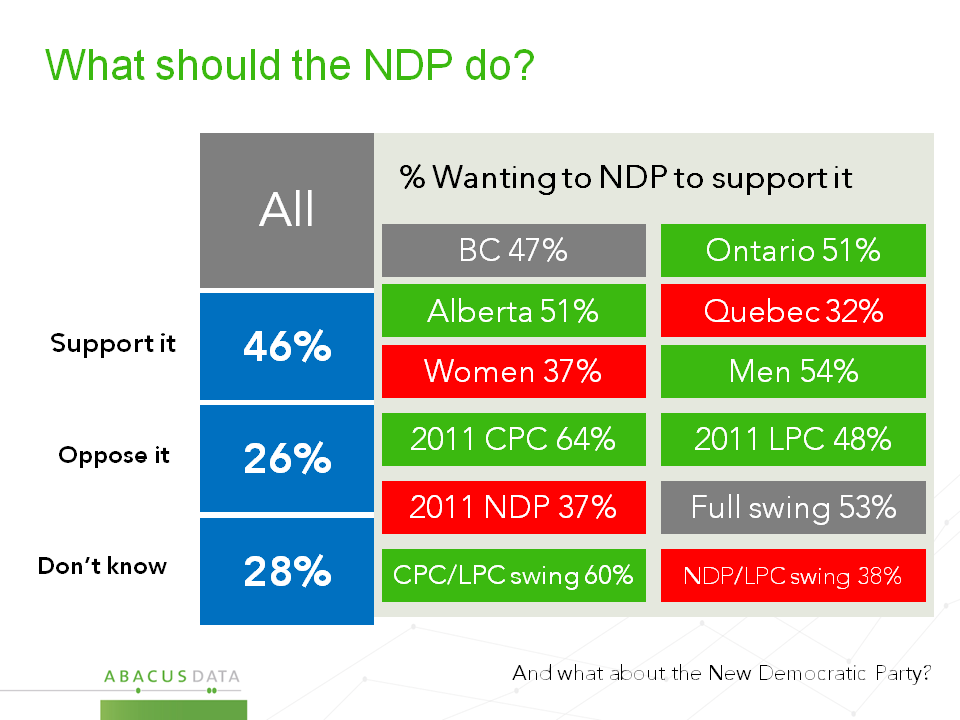
Worth noting is that about one in five people who personally would rather see Canada withdraw think the opposition parties should support a decision to continue, if that is the position taken by the government. Among those who aren’t sure what Canada should do, the tendency is to want to see opposition parties support rather than oppose the government, if it decides to continue.
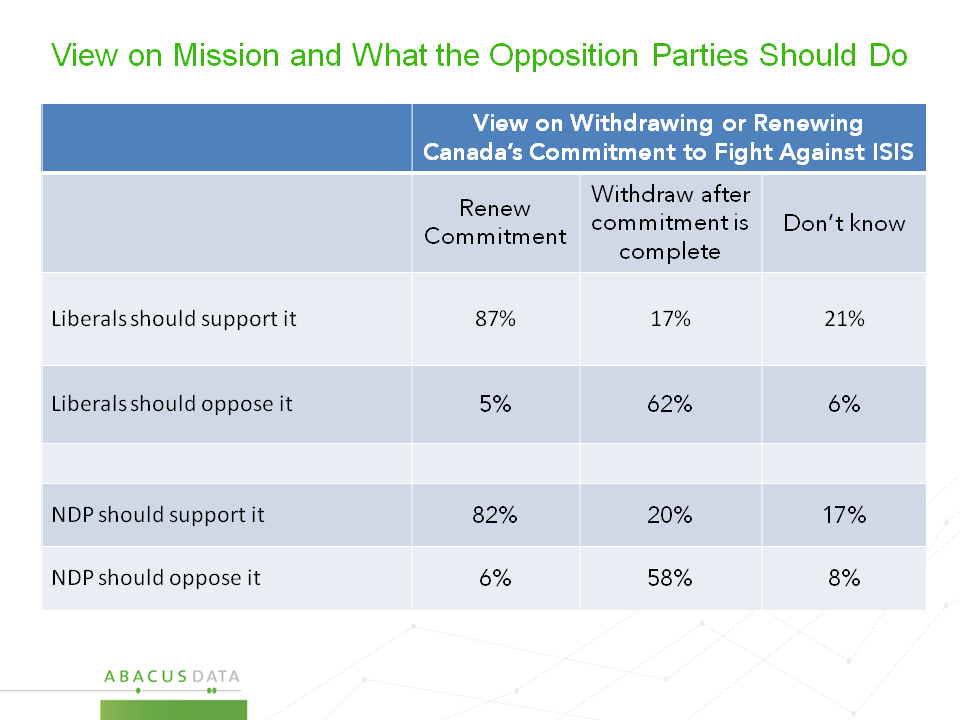
Canadians may hesitate to support a combat role (boots on the ground) but seem reluctant to rule it out as well. 35% say if we participate “we should have our troops be involved in any and all combat roles that are necessary” while 42% say “If we participate we should make sure our troops are not involved in on the ground combat roles” and 23% are unsure.
In Quebec (52%) and BC (42%) , more prefer to avoid combat roles, while in Ontario, the Prairies and Alberta pluralities say we should play whatever role is needed. Opinion is split in Atlantic Canada.
Views on this question are also divided by gender and generation, and political leaning. Worth noting for the Liberals is that voters who will consider only the Liberals and NDP there is a preference for avoiding combat (49%) whereas among those voters who would consider either the Liberals or the Conservatives, the opposite tendency exists.
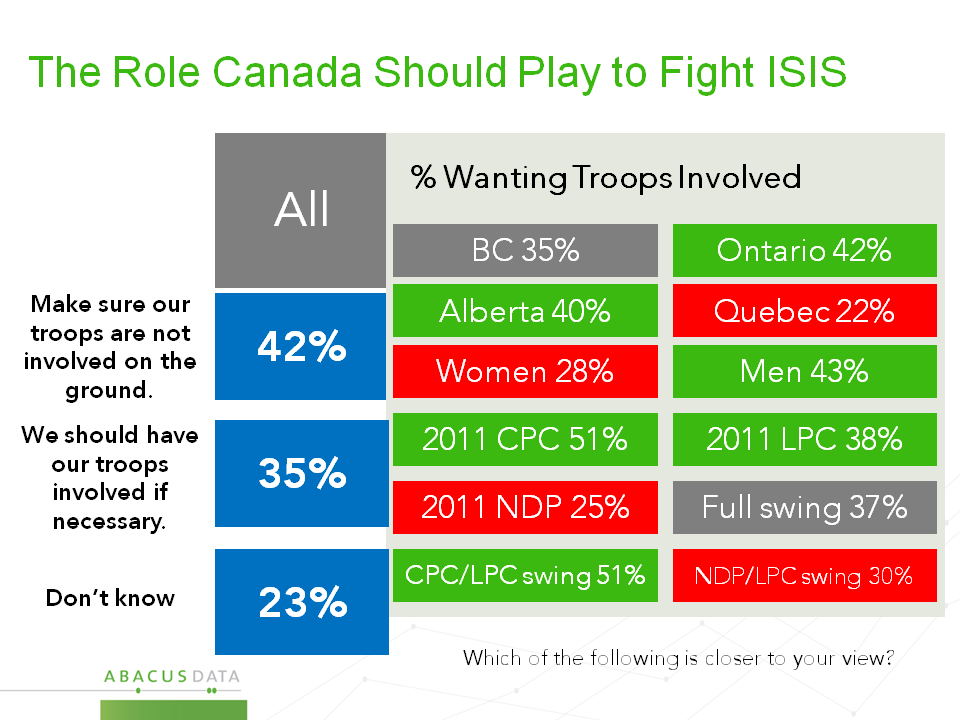
Finally, when asked what effect they thought our participation was having on the threat of terror activities against Canada, 37% said they thought the risk was increasing, 23% reducing and 20% having no effect. Another 20% said they did not know.
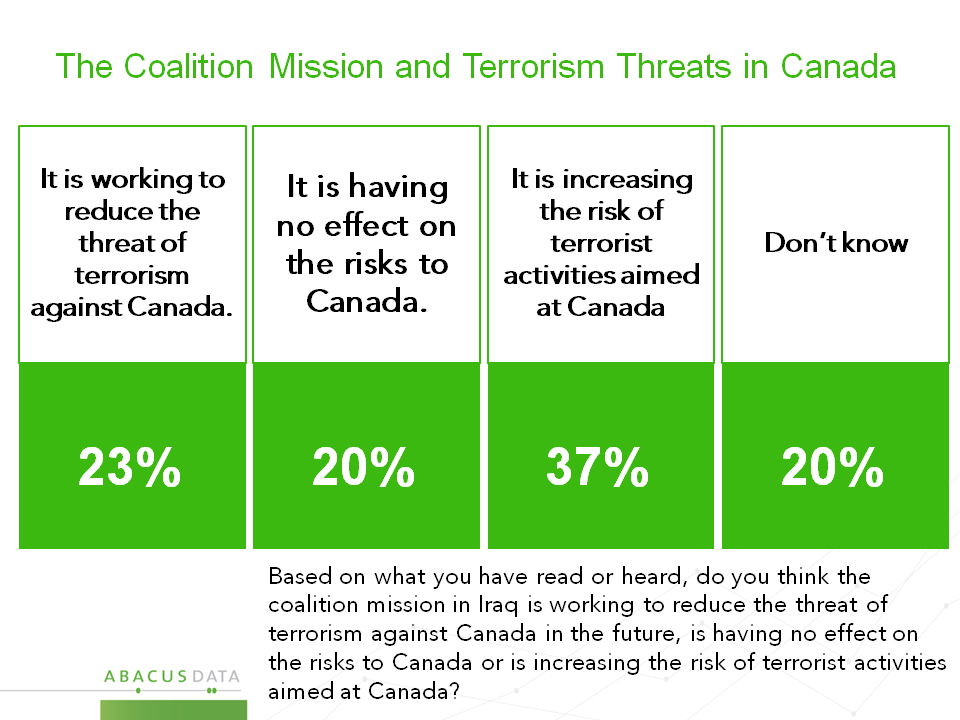
Among those who think that participating in the mission is resulting in a heightened risk to Canada, 31% support taking on combat roles, while 53% prefer to see Canadian troops avoid combat roles. The oppose is true among those who think the mission is reducing the threat of terror attacks in Canada: 57% support a combat role while 33% do not.
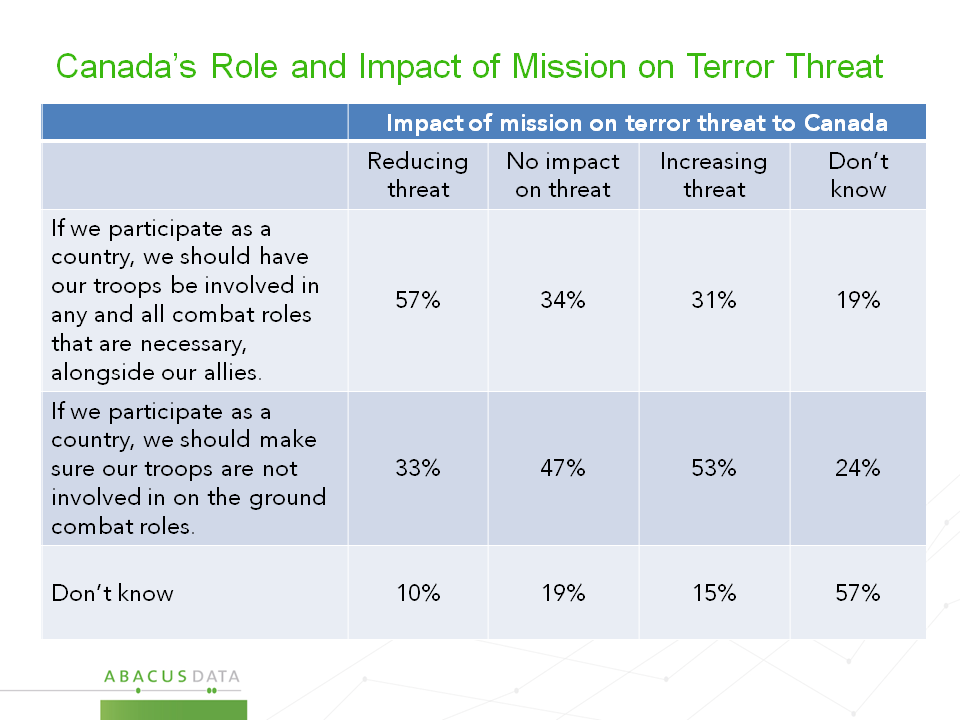
The upshot?
Canadians reveal a degree of uncertainty about the mission, but nothing that could be described as widespread resistance to the idea of continuing. This seems to be a situation where people believe that government leadership should make the decision it feels is best, given the information at their disposal, and if that decision is to continue, then it would be best not to have this be opposed by the other parties.
On the question of combat participation, the results suggest that people might prefer to see Canada avoid such risks, but are also open to the argument that pulling our share means taking on riskier assignments too.
Willingness to go along with the mission, despite feeling that it may be increasing the risks of terrorism against Canada suggests that many Canadians have decided that this is a fight we are obliged to support, and that degrading the risk will take time.
Opposition parties may read these results as a signal that Canadians expect scrutiny and thoughtful debate about our role, but that unless they offer a persuasive argument about what alternative approach would be better, they will be expected by many voters to avoid the temptation to make this a routine exercise in partisan disagreement.
Methodology
Our survey was conducted online with 1,460 Canadians aged 18 and over from February 12 to February 16, 2015. A random sample of panelists was invited to complete the survey from a large representative panel of Canadians, recruited and managed by Research Now, one of the world’s leading provider of online research samples.
The Marketing Research and Intelligence Association policy limits statements about margins of sampling error for most online surveys. The margin of error for a comparable probability-based random sample of the same size is +/- 2.6%, 19 times out of 20. The data were weighted according to census data to ensure that the sample matched Canada’s population according to age, gender, educational attainment, and region. Totals may not add up to 100 due to rounding.
We offer global research capacity with a strong focus on customer service, attention to detail and value added insight. Our team combines the experience of our Chairman Bruce Anderson, one of Canada’s leading research executives for two decades, with the energy, creativity and research expertise of CEO David Coletto, PhD. For more information, visit our website at http://www.abacusdata.ca/
In case you missed it, here are some of our recent releases:
Conservatives and Liberals locked in dead heat. Eve Adams defection reactions mixed.
Economic anxiety on the rise; Canadians want pragmatic policy making
Should carbon be priced? Should public opinion decide pipelines?




